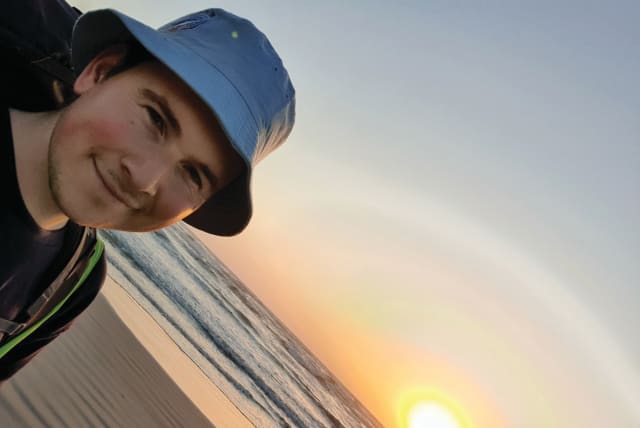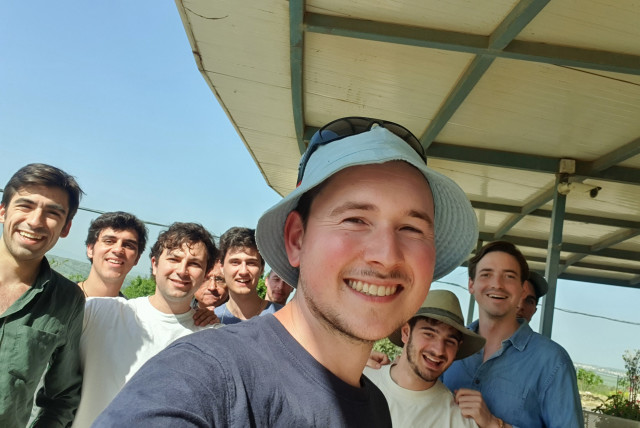Blue and white in green: A released IDF soldier's hike through Israel

Journey with this new oleh – and recently demobbed IDF paratrooper – as he walks for Israel.
Aaron Seitler is one hardy soul.
Yes, making aliyah solo at the age of 23 can be a challenge in itself. He then followed that up by not just volunteering for the IDF, but he went the whole idealist hog and served in the paratroopers for 18 months. Either of those two game changer moves alone warrants the addition of the “courageous” epithet. But Manchester, England-born Seitler appears to be made of even sterner stuff.
He also seems to have the knack of riding his luck. Actually, as a religiously observant young man, Seitler, who came here armed with an undergraduate degree in history from University College London, would probably place any opportune development in his life in the divine intervention category. Consider the simple, but somewhat chilling, fact that he was officially demobbed [released] from the IDF on October 6, 2023.
“Yes, I don’t think things just happen,” he posits. “Things happen for a reason, and I thought there may be something I need to do. Perhaps this walk is it. There was a reason why I was released on October 6, not October 7.”
There may very well be. But whatever the underlying motives or catalysts, Seitler is out there traversing various sections of the Israel Trail – he plans to cover 440 km. of the approximately 1,000 km. of the full cross-country route – in a meritorious physically and emotionally challenging effort to enable others to benefit from sorely needed emotional succor.
I joined him for a few kilometers of his long fundraising trek when he was in my neck of the woods near the Ella Valley not far from Beit Shemesh. Together we traipsed through fields that were just past their verdant springtime zenith, and orchards of olive trees and other fruit trees, while the mud from possibly the last pre-summer rain clung to our shoes.
We got right down to the altruistic act he is currently performing. “The idea is to do a sponsored walk across the country, to raise as much money as possible for what’s called ecotherapy,” Seitler explains. That, specifically, is facilitated through the Society for Protection of Nature in Israel (SPNI) and references a form of treatment that involves engaging in outdoor activities deep within Mother Nature’s soothing bosom.
Seitler has his philanthropic sights set on victims – firsthand or sufferers from the secondary circle – of the violence unleashed on us the day after he completed his army service.
“This is a natural therapy where former hostages, hostage relatives, and former soldiers, and other people suffering from trauma through the war are very simply taken out to nature,” he adds.
They are not left there to just get on with some beneficial communing. “They go out with guides and licensed social workers. Through the experience, they manage to overcome the symptoms of night paralysis and anxiety that plague them due to their experiences, just through the simple interaction with nature and animals that the country offers.”
No one can go through 18 months of combat military training – even if they don’t get to put it into practice on an actual battlefield – without experiencing a couple of epiphanous moments. Seitler negotiated several such pivotal junctures. “I realized in the army that my real passion – and they actually talk about this a lot in the army, they say ‘techapess et hamashma’ut shelcha’ (find your calling) – I found my passion was not killing terrorists. My passion – and I realized this after spending a lot of time in the field – was nature.” Simply and succinctly put. Hence, the lengthy hike up and down the country.
Protecting Israel’s ecosystem
That did not mean Seitler was about to cast caution to the wind and leave the country to its own devices.
“I realized there are lots of ways to defend the land, and killing terrorists is one of them. But the land also needs to be protected from litter, from uncontrolled urban expansion. We are at the convergence of continents, which means this is a very important migratory site for birds. It is a very fragile ecosystem.”
That features in Seitler’s life and, no doubt, will eventually inform his professional goals. “There is already plenty that has been destroyed. I was talking to a shvilist [trail walker] just last week. He told me that if you take someone who did deep sea diving in Eilat 20 years ago and take someone who did that recently, the experience is incomparable because, unfortunately, so much of the coral has been bleached, and there are fewer fish.”
Seitler is no radical activist. Yes, he wants us to change the way we think about our lifestyle, but he also recognizes the practicalities of modern-day living.
“There are economic agreements that Israel has struck, to leach the natural resources there [in the Red Sea]. It is understood. We want the economy to grow and, what’s more, we believe in settling the land. Sometimes those things get in the way of ecological protection. We should try as much as possible to grow our country and our population in a sustained way.”
Indeed, the Bible has it that that is our very purpose here on terra firma. To quote from Genesis: “The Lord God placed the man in the Garden of Eden to tend and watch over it.”
That cognizance left an enduring imprint on Seitler’s consciousness when he joined his comrades in khaki out in the field on military maneuvers and other army activities. “I saw how much junk and garbage the army was leaving behind it, in nature, after exercises. We treat the field like garbage – literally. What’s the point of protecting it from external invaders if you don’t value it yourself?”
That’s a salient existential point, which may not sit too well with the folks higher up the political and military ladders. But the former Mancunian is determined to do his bit not only to protect some of Mother Nature’s treasures in these here parts but also to make them available to people who need them the most.
Seitler says his green remedial-supporting endeavor comes from a basic need for survival and a desire for what he considers quality of life. “I wasn’t able to support this [ecological] cause there in a very dictatorial system in the army, but I thought that once I come out of the army I would do something. I wanted, personally, to breathe fresh air. So I thought that if I could marry that with some ideological cause, that would be fantastic.”
AS THE horrors of the Hamas massacre unfolded, Seitler’s first instinct was to join the members of the IDF unit he had just left in Gaza. But his parents were in the country at the time, to spend some time with him during his end-of-service leave.
They responded as many a parent would by imploring Seitler not to volunteer to re-enlist. The young man eventually concurred and quickly set about putting his healing plans into practice. “My parents would have had one child in Gaza,” he says. “That’s one child too many in Gaza.”
As he notes on his fundraising page (www.charidy.com/Aaronshike), at least one in three Israelis suffer from PTSD symptoms. That is an astounding statistic, and one that has dire implications for the health of Israeli society across the board. Seitler felt it was high time he did his bit for that cause and boost the SPNI’s efforts to address the shocking state of affairs.
“Since the beginning of the war, the SPNI has hosted over 1,000 Israeli evacuees in their field schools and enabled hundreds of Israeli youth to escape the trauma and horror of their harsh reality in desert retreats,” he notes. “As a former madrich [youth leader] in Bnei Akiva, and youth director with the United Synagogue, I identified particularly strongly with the plight of Israel’s young people.
“Now SPNI is planning to do even more to help our traumatized nation with its Nature Heals project: an eco-therapy program to make the healing power of nature accessible to the public.”
I was taken with Seitler’s dogged determination to make a difference about the emotional state of play here, while he almost imperceptibly bonded ever more firmly with the land. As many an oleh may be able to testify, once the initial Zionist fire and zeal have ebbed, harsh cold reality begins to dawn and the practicalities of managing in a very different society, with contrasting mores and street-level codes of behavior, can be trying in the extreme.
After a year and a half of intense combat unit IDF service, Seitler was having second thoughts about staying here. “I was back in Manchester over Hanukkah and I thought that’s it, Israel is too tough for me, I want a more manageable life in terms of security risks and other things,” he recalls.
But, as he had already embarked on his fundraising walk, he was duty-bound to return, to at least complete the 440 km. hike and try to meet the financial target he’d set for himself – NIS 44,000, which equates to one shekel per 10 meters he walks along the Israel Trail. That was his “undoing.”
“I contacted SPNI, and I decided that the way I would contribute was instead of going to fight with my comrades on the front lines, to pioneer this [fundraising] campaign.”
In so doing, he found himself being drawn inexorably ever closer to the soil, rocks, birds and animals, trees and – at this time of year – polychromic floral displays across the land. He says he now feels more in tune with this part of the world and is here to stay.
“Just over the hill is the valley where I believe Goliath and David fought,” Seitler remarks as we move eastward to the foothills of the Ella Valley. “There is so much history here.”
There is that, in addition to delicate transient floral offerings, valuable fragile ecosystems and, unfortunately, many people who could do with taking in some of Mother Nature’s calming curative vibes. Seitler is doing his best to make that happen. ■
For more information about Aaron Seitler’s hike: inthelandofshpilkandhoney.wordpress.com
Jerusalem Post Store
`; document.getElementById("linkPremium").innerHTML = cont; var divWithLink = document.getElementById("premium-link"); if (divWithLink !== null && divWithLink !== 'undefined') { divWithLink.style.border = "solid 1px #cb0f3e"; divWithLink.style.textAlign = "center"; divWithLink.style.marginBottom = "15px"; divWithLink.style.marginTop = "15px"; divWithLink.style.width = "100%"; divWithLink.style.backgroundColor = "#122952"; divWithLink.style.color = "#ffffff"; divWithLink.style.lineHeight = "1.5"; } } (function (v, i) { });

